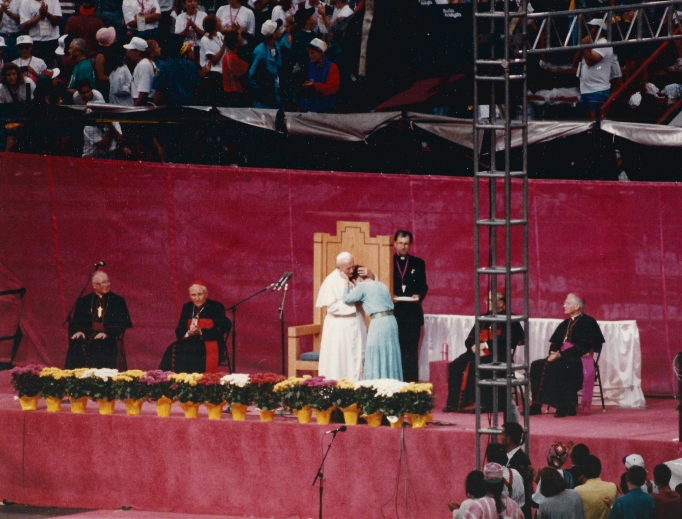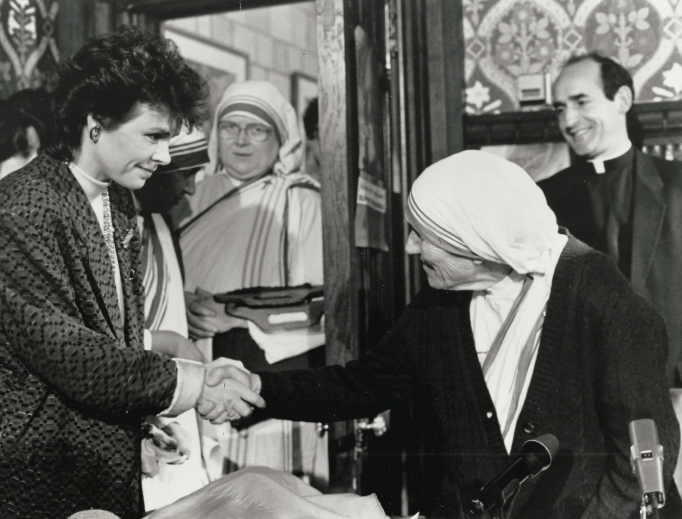Singing for the Pope: Dana Scallon Recalls WYD ’93, Shares Hopes for Ireland
Irish singer reflects on faith and the state of the Emerald Isle as Ireland gathers for World Meeting of Families 2018.

Still an Irish schoolgirl, Dana Scallon won the 1970 “Eurovision Song Contest” with All Kinds of Everything. It became an international best-seller and launched her music career. Thereafter, she became a household name across Europe, with regular appearances in the pop charts as well as on television, in film and in theater.
From the early 1990s, Dana, as she is known, has appeared regularly on EWTN. At the 1993 Denver World Youth Day, she wrote and sang the theme song, We Are One Body, for Pope St. John Paul II.
In 1997 and 2011, Dana ran for the office of president of Ireland on a pro-life, pro-family ticket. She served as an Irish member of the European Parliament from 1999 to 2004.
Today, Dana continues to sing and speak at events and conferences throughout the United States, affirming Catholics in their faith. Register correspondent K.V. Turley spoke to Dana as pilgrims from around the world began to gather in Ireland preceding Pope Francis’ visit during the World Meeting of Families 2018 in Dublin.
The first papal visit to Ireland was almost 40 years ago. What are your memories of Ireland then, especially in regard to the faith?
The Charismatic Renewal had swept through Ireland in the early 1970s. As a result, very active Catholic and ecumenical prayer groups and communities sprang up throughout the country, perhaps particularly in Dublin, Belfast and Derry, my hometown. These prayer groups were still thriving when our Holy Father came in 1979.
There was disbelief that a pope would actually visit our little country; and for the “ordinary” Catholic layperson, young or old, there was tremendous happiness and joy at his visit and at the inspiring words spoken by this incredibly charismatic, loving Holy Father.
The Catholic community in the North had really hoped that the Pope would include a visit there, but it was still a very tense and violent time, and opposition was loud and threatening from leaders in the Protestant community. This was a great disappointment, as the Holy Father was seen as a ray of hope in a very dark time.
However, after the Pope’s visit, my husband, Damien, and I wrote a song, inspired by his motto, called Totus Tuus. During interviews in Dublin about the inspiration for the song, it was apparent that there was resentment from some media people at what they saw as the power and influence enjoyed by the hierarchy of the Catholic Church since the foundation of the Irish state. I was surprised at this; however, I have seen this resentment grow and become more outspoken over the years.
How significant were Pope St. John Paul II’s words on the Northern Ireland conflict?
His words were of great importance. As he said, he came as a pilgrim of Christ’s peace, and he begged men and women involved in violence to return to the ways of peace. Although many of those involved in violence may have shut their ears and hearts to his words, there were many who heard them and took them to heart. They were greatly needed and appreciated by the ordinary men, women and young people who were struggling to survive and keep hope alive in a seemingly endless war zone, where bombs, threats and deaths were a daily occurrence.
And, today, how do you see matters — both secular and sacred — across Ireland?
The Church has been deeply wounded by the disclosures of abuse, but perhaps particularly by the cover-ups and denial of that abuse. It is clear that many feel the well-being of the “institution” was more important to Church leaders than the well-being of the victims of abuse. Added to that, we have very little media coverage of the work done by good priests and religious who have faithfully served and shown Christian love to those in their care. This has had a devastating effect on the faith in Ireland, especially of our young people.
What are your hopes for the visit of Pope Francis?
My hope is that for those attending the World Meeting of Families and for the world watching and listening, there will be clear teaching of the truths of the Catholic Church and that many will be blessed and encouraged.
Did you think that the recent referenda — same-sex “marriage” (2015) and abortion (2018) — are a major departure from Ireland’s past?
Yes, the results of these recent referenda are a major departure from the constitutional and legal protection previously afforded to the family, based on the marriage of a man and a woman and to the unborn child from the moment of its conception. In the run-up to both of these referenda, which were decided by the public vote, there was a unique opportunity to clearly and in a loving way explain the teachings of the Church on the vital matters of Christian marriage and protection of life from conception to natural death. Many, like me, feel that, with a few greatly appreciated exceptions, this opportunity was lost, or abandoned, or left until too late by most of our Church leaders.
Why are Irish Catholics voting in these ways?
That’s a question many Irish people are asking themselves. In the past, the teaching of the truths of our Church took place initially in the home; it was then reinforced in the churches and in the schools, which were generally run by nuns or priests. Also in society at that time, parents did not face the fierce opposition to Catholic teaching that we experience today and, indeed, now have faced over many years. Today, of course, there are few nuns or priests teaching in Irish schools, and the undermining of people’s trust in the protection and care of the Church, combined with an almost-daily highlighting by the media of the failings in the Church, has had a devastating effect on the way the people of Ireland feel about the Catholic Church and its teachings. This, in turn, has a direct effect on how the people have voted on matters central to the teachings of the Catholic Church.
Where do you think modern Ireland is heading, and how do we renew the Catholic faith in Ireland?
There is still a deep faith in Ireland, especially perhaps among those who remember a more innocent time. There is also, I believe, a recognition that our faith cannot depend on the actions or the non-action of individuals in the Church, but on our personal relationship with God and on our personal holiness.
We need the Church and the healing sacraments of the Church to fully live our lives. We have some wonderful priests who are working so hard, often alone in their parishes; and although fewer in number than in the past, our newly ordained priests are outstanding men: prayerful, Eucharistic and with a deep love of our Blessed Mother.
I have also found the young people of Ireland to be generally kind and thoughtful. They are not afraid to stand up for what they believe to be right and fair. They also have a wonderful, if at times devastating, sense of humor. As with most young people, they long for the truth; they’re not afraid of being challenged. They have a deep spiritual capacity.
For the Catholic faith to be renewed in Ireland, or anywhere else for that matter, people need and long for strong, positive leadership that will speak the truth and confront and deal with the problems and the evils that have so damaged and hurt the Church and its members. To revive our own faith, and therefore the faith of the Church in Ireland (and elsewhere), we all need a strong prayer life and the sacraments, daily Rosary and Eucharistic adoration.
The incredible apparition of Knock encapsulated these faith-saving gifts without speaking a word. Just look at the images and see how clearly they spoke to the Irish people of that time and throughout the following years.
The Irish presidential election — an office you were nominated to run for in 1997 and 2011 — takes place later this year. How do you see the coming election? It is a largely symbolic role, so does it matter to Ireland’s future?
The Irish Constitution upholds that the people have the right to directly vote for their president and that the president’s primary duty is to uphold and protect the Irish Constitution on behalf of the Irish people. The preamble of our constitution begins with the words, “In the name of the most Holy Trinity from Whom is all authority and to whom, as our final end, all actions both of men and states must be referred …” This is a Christian constitution based on natural law. The choice of president is, therefore, of great importance.
As was explained to me when I ran for the office of president, no government would choose to put a constitutional amendment before a president they felt was likely to reject that amendment, as it would lead to a constitutional crisis. I had not thought of that scenario, but it made me acutely aware of the importance of the kind of person chosen to be president of Ireland and protector of the Irish Constitution.
There will be an election in November 2018. At this stage, it is impossible to predict the outcome.
Do you think it is important that faithful Catholics continue to engage fully, both as voters and politicians, in Irish and European politics?
Yes, I do believe it’s important to vote or, in some cases, to run for elected office. The right to vote was a hard-won right. In the North of Ireland, “one man, one vote” only became law in the late 1960s, following in the footsteps of African-Americans in the United States. However, it’s very disheartening to feel you have no one to vote for because no one seems to share your beliefs and your concerns. However, if faithful Catholics fail to vote, they in effect have no voice, no representation for the kind of society they want to live in and raise their families in. We have to engage with our political candidates and elected politicians. There are often cases where a politician is constrained by party whip and needs our public voice to give him or her the support they need to vote with their conscience. The power of the voice of the grassroots voter should never be underestimated, and it is important to network and unite the voices of like-minded voters.
What advice would you give anyone thinking of entering politics?
Pray very hard before deciding. Then have people supporting you that you feel you can trust. Seek advice from those who have experience in political campaigning. Decide on the “platform” you’ll run on. Know your subjects and be able to answer questions clearly on a number of levels. Know who you’ll be interviewed by and, in particular, who you’ll be debating with. If possible, only do “live” media interviews, as editing can misrepresent your views and beliefs. There are many other points, but the bottom and most important line is this: If you believe God is calling you to run for office or to speak out, then remember you are told not to be afraid, because he will put his words on your lips.
It has been 25 years since you performed at World Youth Day in Denver. What are your memories of that day?
It was a very challenging road to Denver, and I truly thought I’d be lucky to even see the Pope there, never mind sing before him. I was waiting at the side of the stage area when his helicopter flew overhead. The pilot later said that the cheers from the crowd caused such air turbulence that it reminded him of flying under fire in Vietnam.
My choir of teenagers was from Birmingham, Alabama. They were also waiting at the side of the stage. One of them was a beautiful young girl in a wheelchair. As soon as the Holy Father saw her, he immediately made his way over to her and blessed her, along with the other young people in the choir. They were all in tears.
When my name was called from the stage, I walked out to a breathtaking view of almost 100,000 jubilant faces before me. Colorful flags and banners from every diocese in the U.S. and every country in the world seemed to dance in the air throughout the stadium. I took a deep breath and began to sing We Are One Body.
Nothing could have prepared me for the incredible reaction when we all finished singing the last line of the song, hands clasped and arms raised in the air, “We are one body, one Body in Christ. And he came that we might have life.” There was a moment of silence; then the stadium erupted with prolonged applause and cheers. I think I was in shock. Suddenly, I felt a tap on my shoulder, and as I looked up, a priest said, “Follow me. The Holy Father would like to meet you.”
Then I really was in shock, for I’d been told I definitely wouldn’t meet the Pope. I followed the priest up the stairs of the podium behind me, but when I got a few steps from the Holy Father himself, I couldn’t move at all, as tears ran down my face. The Pope stretched out his arms to me, and the next moment my head was on his shoulder. He kissed the top of my head and thanked me for my song.

It’s a moment I’ll never forget, and it was a moment that millions shared with me in a personal way, for so many people have told me that when the Pope put his arms around me, they felt as though he had put his arms around them, too.
I then told the Holy Father that Mother Angelica and all at EWTN sent him their love. It was a little joke Mother and I had shared before we left Birmingham for World Youth Day. Although I’d been told I’d never meet him, she said with a laugh, “Don’t forget to tell the Pope that I send love from us all at EWTN.” I said I would, but I never dreamed I’d actually be able to do it.
The 1993 World Youth Day was so powerful that it has been recognized as a turning point in the history of the Catholic Church in the United States and the real starting point of the New Evangelization (see related story on B1). Countless vocations have come from that wonderful World Youth Day, and the words Pope St. John Paul spoke to us are as true today as they were then: “Do not be afraid to go out on the streets and public places, like the first apostles who preached Christ and the Good News of salvation in the squares of cities, towns and villages. This is no time to be ashamed of the Gospel. … It is time to preach it from the rooftops.”
K.V. Turley writes from London.

ONLINE

















